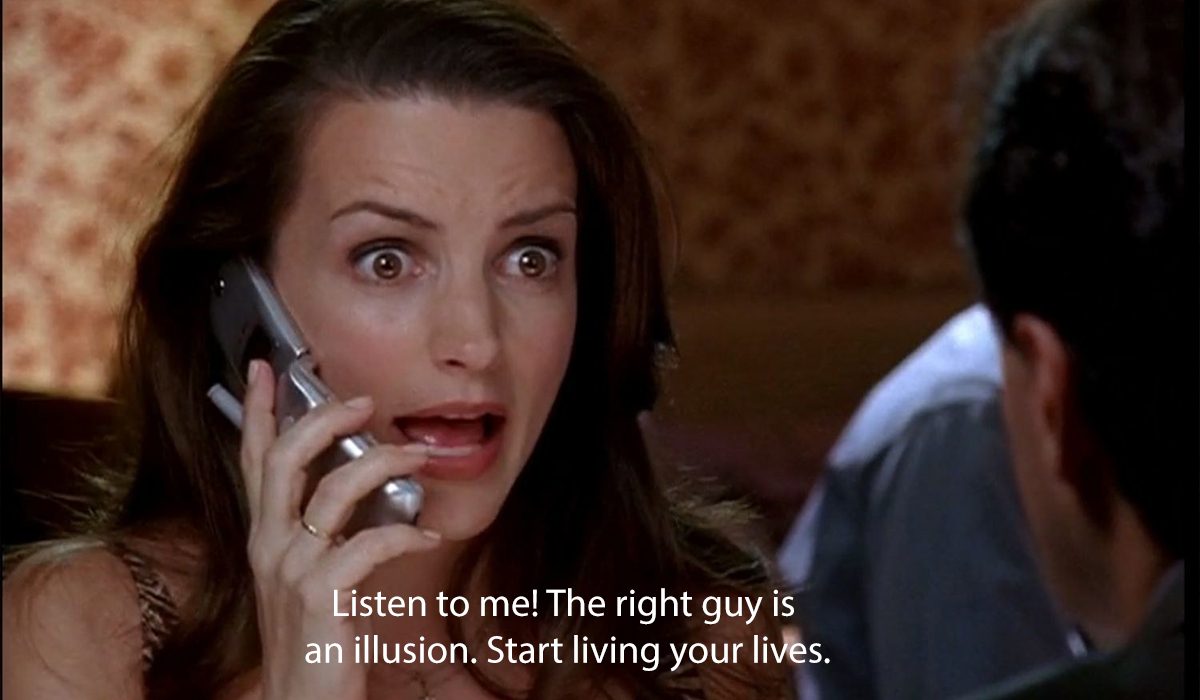I remember getting into my car and going to the local movie rental store (I’m looking at you, Blockbuster), and renting DVDs of Sex and the City. It was a whole event – one that felt both cool and rebellious at the same time. The characters were frank and the topics they tackled were intriguing – ranging from sexuality to personal identity. It was a show that made me feel comfortable expressing my sexuality but beyond that, it made me feel confident in being independent. The women seemed to value singledom instead of being ashamed of it, which is something that I appreciate about the show to this day. However, as I look back on Sex and the City 18 years later, I not only see what I loved about the show, but I also see how poorly they handled sensitive topics and storylines. And I’m not the only one whose noticed, either.
Like seeing a one-night-stand the morning after – it’s difficult to view Sex and the City once you’re ‘woke.’ Thankfully, the ladies behind the Instagram @everyoutfitonsatc have created the meme #WokeCharlotte which sets out to rewrite HBO history by recasting Charlotte as “the fictitious voice of reason that Sex and the City desperately needed but never actually had.” Chelsea Fairless and Lauren Garroni are the creators of @everyoutfitonsatc which chronicles every outfit ever seen on Sex and the City. They’re also the masterminds behind the brilliant hashtag #WokeCharlotte which takes excerpts from classic Sex and the City episodes and places them alongside screen caps of Charlotte, as she commands the other women to check their damn privilege. What started out as an inside joke between friends is now a joke that we’re all in on and the result is not only entertaining, it’s poignant.
Introducing #WokeCharlotte, the fictitious voice of reason that Sex and the City desperately needed but never actually had. Today, she schools Carrie on why referring to her jewelry as “ghetto gold” isn’t cool. (S4/EP16) #CharlotteYork #WokeCharlotte A post shared by Every Outfit on Sex & the City (@everyoutfitonsatc) on
Take the aptly titled “Boy, Girl, Boy, Girl” episode, for example. When the women meet to discuss their love life woes, Carrie confides that the man that she’s dating is bisexual, to which Samantha replies: “You know, that generation is all about sexual experimentation. All the kids are going bi.” Carrie later ends up at a party with her bisexual boyfriend; a party that ends with a rousing game of spin the bottle and culminates with Alanis Morsette sitting across from Carrie, placing a soft one on her lips. The kiss doesn’t change Carrie’s mind about bisexuality – if anything, it affirms it. She is simply “too old” to partake – as if bisexuality were a choice, or had literally anything, at all, to do with age (insert face palm emoji here.) Certainly, in the late nineties and early 2000’s the idea of discussing bisexuality must have seemed progressive but looking back it’s obvious that their attempt at tackling the topic was futile and limited, to say the least. Thankfully, we have our trusty sidekick #WokeCharlotte around to remind Carrie that “bisexuality is a real sexual orientation.” Unfortunately, queer issues aren’t the only topic that Sex and the City did a disservice to. Classism and racism were also topics that were dealt with extremely poorly, if dealt with at all (considering the small number of POC who appeared on the show.)
On this deeply problematic holiday, #WokeCharlotte is here to remind us that racism is never ok and failing to address it directly is what allows it to continue. Plus, you know that Bunny voted for Trump. (S4/EP12) #CharlotteWokenblatt #BunnyMacDougal #ThanksgivingMuse #MandarinBaby #PearlMoment A post shared by Every Outfit on Sex & the City (@everyoutfitonsatc) on
#WokeCharlotte serves as a reminder that what was considered innovative in one decade is not necessarily innovative in the next. When the novelty wears off we must call out how the previous generations fell short so that we can continue to improve. This evolution of awareness doesn’t have to diminish Sex and the City in its entirety – on the contrary, it shows that we’ve grown as a society in the same way that Carrie, Samantha, Miranda, and Charlotte had encouraged us to – and part of that growth involves challenging preconceived notions in the same way that they did. The biggest difference between 1998 and 2018? In 1998, Sex and the City showed us it was okay to ask questions and talk openly about sexuality. In 2018, not only can we talk openly about our own sexuality, we can do so without judging the race, class, or orientation of others.


